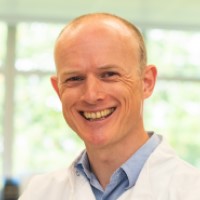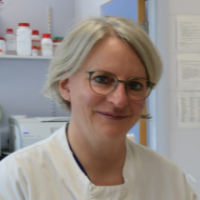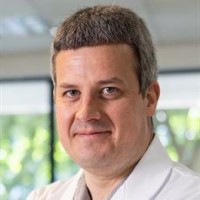Can you help make sure the next cancer discovery is Made in Birmingham?
One in two people in the UK will get cancer in their lifetimes. Two things make a huge difference; finding it early and matching the right treatment to the individual - a lifesaver for one patient could be useless for another. We are harnessing the latest technology, advancing discovery science, and creating new and kinder treatments.
With your support, we focus on a wide range of cancers including those that are rare and harder to treat. You can help us:
- Find the genetic indicators that could catch cancer earlier
- Teach our immune systems to target cancer cells
- Get more patients into clinical trials
- Recruit PhD students to push the boundaries of our research
Professor Mat Coleman needs your support
 Matt and his team are focussed on hard-to-treat cancers like gliobastoma. This is the most common form of brain cancer, and even after treatment many people are given just a year to live. His work focusses MINA, a type of oxygenese (oxygenes are a group of enzymes) and his team have discovered there is much more MINA in tumour cells causing them to grow out of control. They have designed a range of drugs that can kills the cancerous cells, and even make standard chemotherapy more effective at a lower dose.
Matt and his team are focussed on hard-to-treat cancers like gliobastoma. This is the most common form of brain cancer, and even after treatment many people are given just a year to live. His work focusses MINA, a type of oxygenese (oxygenes are a group of enzymes) and his team have discovered there is much more MINA in tumour cells causing them to grow out of control. They have designed a range of drugs that can kills the cancerous cells, and even make standard chemotherapy more effective at a lower dose.
Researchers like Susanne are making a huge difference
 Susanne Gatz aims to identify new and tailored treatments for children with fusion-negative rhabdomyosarcoma. She says: ‘It's so important that we can take risks to see if we can discover something truely ground-breaking. Students are the key to making research happen’.
Susanne Gatz aims to identify new and tailored treatments for children with fusion-negative rhabdomyosarcoma. She says: ‘It's so important that we can take risks to see if we can discover something truely ground-breaking. Students are the key to making research happen’.
Help Professor Jason Parsons develop new treatments

Jason utilises the unqiue radiation facilities in Birmingham including the MC40 cyclotron, one of only 3 in the world. His work looks at the effects of different types of radiotherapy on tumour models with specific focus on the head and neck. His aim is to devise new and better ways to use radiotherapy leading to more effective treatments, and better survival rates for patients.
RAZOR VIEW ERROR
The control '' has raised the following error:
Cannot perform runtime binding on a null reference